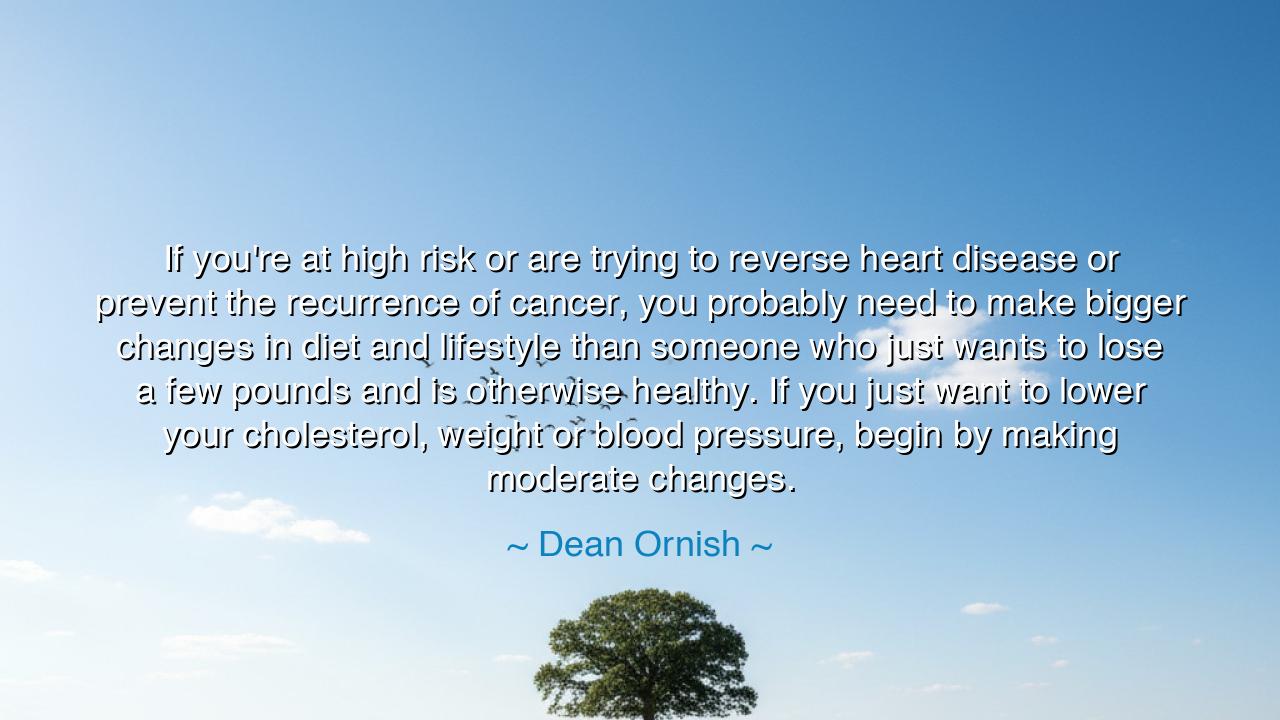
If you're at high risk or are trying to reverse heart disease or
If you're at high risk or are trying to reverse heart disease or prevent the recurrence of cancer, you probably need to make bigger changes in diet and lifestyle than someone who just wants to lose a few pounds and is otherwise healthy. If you just want to lower your cholesterol, weight or blood pressure, begin by making moderate changes.






In the wise and measured words of Dean Ornish, the healer who weds science with compassion, there lies a message as practical as it is profound: “If you're at high risk or are trying to reverse heart disease or prevent the recurrence of cancer, you probably need to make bigger changes in diet and lifestyle than someone who just wants to lose a few pounds and is otherwise healthy. If you just want to lower your cholesterol, weight, or blood pressure, begin by making moderate changes.” Though these words may seem simple, they echo the timeless wisdom of balance, proportion, and the sacred art of self-knowledge. For they remind us that healing, like all transformation, demands not rashness but discernment — knowing how deep the wound lies before choosing how powerful the remedy must be.
The ancients understood this law well. The great physician Hippocrates, father of medicine, taught that the doctor must treat “not the disease, but the patient.” He knew that what heals one may harm another, that the cure must match the condition. A man in the shadow of death must sometimes rebuild his life from its foundations; another, only trim the excess that clouds his strength. Dean Ornish speaks in the same spirit: he calls not for rigid uniformity, but for wisdom in action — for tailoring one’s transformation to one’s need. Whether you must rebuild the temple or merely cleanse its walls depends not on desire alone, but on the measure of your condition and the courage of your intent.
There is a story told of Asclepius, the ancient god of healing, whose two serpents wound around the same staff: one of moderation, the other of radical renewal. When the sickness was light, Asclepius prescribed the gentler path — herbs, rest, and fasting. But when the sickness of the soul or body ran deep, he demanded the full transformation: purification through sweat, silence, and sacrifice. Ornish’s wisdom mirrors this dual path. The body, he teaches, can heal itself, but the depth of healing required determines the extent of change demanded. For the one who faces grave illness, half-measures will not suffice; yet for the one who seeks mere refinement, gentleness is the better guide.
Thus, his words are not only medical counsel but philosophy for living. They speak of the importance of recognizing where one stands upon the road of life — of knowing when to walk and when to climb. Many today rush blindly, adopting extremes in diet, work, or faith, without understanding their true condition. But the wise act with awareness. They listen to the quiet voice of the body, the whisper of balance that says: “Begin where you are, not where another stands.” To demand too much too soon can break the spirit; to demand too little can leave one unchanged. The secret lies in knowing the right measure.
Consider the example of Emperor Ashoka, the mighty ruler of India, who in youth was fierce and violent, but after witnessing the suffering of war, turned wholly to peace. His transformation was not small, for his disease was not of the body but of the soul. He needed great change to find healing. Yet his people, who had known only the old ways of conquest, learned moderation from his example: they changed gradually, guided by his new laws of compassion. Thus, the emperor and his people both healed — one through radical reform, the other through patient evolution. So it is with health and spirit alike: great wounds require great remedies; small imbalances require gentle correction.
In these teachings, Dean Ornish gives us both a map and a mirror. He teaches that healing is a spectrum, not a single road. For those in peril, transformation must be total — a renewal of diet, lifestyle, and thought. But for those who seek only improvement, the path may begin with small acts: a meal made wholesome, a walk taken in the morning light, a few moments of stillness after the day’s labor. Every change, however modest, sets in motion the power of renewal. It is not the speed but the sincerity of the journey that brings life back into balance.
So, my child of the future, let this be your guiding star: know thyself, and act accordingly. If your sickness runs deep, be brave enough to begin anew; if it is slight, be wise enough to begin gently. Do not despise small beginnings, for every mighty oak was once a tender shoot. Let your diet, your habits, your choices become prayers for health — acts of harmony with your own nature. And remember: the goal is not perfection, but balance. For the body, like the soul, seeks only this — not the fire of extremes, but the steady flame of moderation, burning bright enough to heal, and calm enough to endure.






AAdministratorAdministrator
Welcome, honored guests. Please leave a comment, we will respond soon